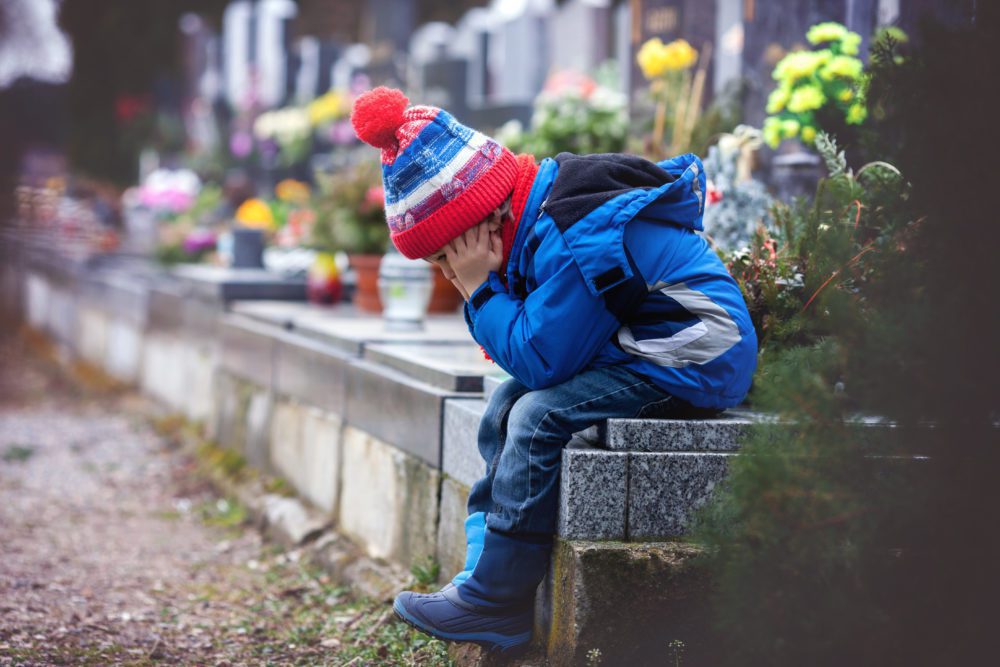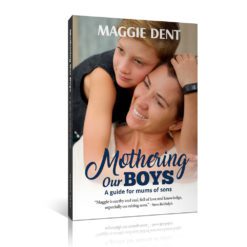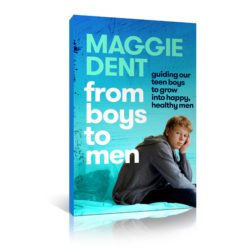Death & Loss, Newsletter Articles, Posts for Parents, Raising Boys
Helping boys understand loss and death

Even as adults we find significant loss experiences of any kind hurt. So we can imagine how it is for children. The separation distress that many of our young children experience is a good example of this because, in the eyes of the child, they have lost connection (albeit temporarily) with the safest grown-up they know. Given that little boys can often struggle with feeling safe and loved – especially when they seem to be making lots of random poor choices – then loss can be so confusing for them.
Neuroscientific research shows that girls can access their verbal centres when feeling distressed much more easily than boys. Boys tend to struggle with this so they can’t always communicate to us in words and therefore we can fail to read their feelings. We can help our boys cope better right though life, if we can help to build an understanding about loss and its companion grief, and the ensuing hurt that comes with them.
The most significant loss experience that will challenge you in life is the loss of someone you love dearly when they die.
So often, particularly as loving mums, we want to protect our children from death and we avoid dealing with it, but unfortunately, we are actually protecting them from a vital learning and this will come at a great cost later in life.
Coping with significant loss and death is a crucial life skill that children can benefit from experiencing while they are still children. I have met many people over the years who were told that their family dog had been sent to a farm and that was why he wasn’t in the family home any more, only to find out many years later that he had been put down by the vet because he was very unwell. In a way, farm kids get to see and become familiar with death simply because animal deaths naturally occur over time in a farm setting. I still vividly remember my 15-year-old brother sobbing in the shed when his pet joey (a baby kangaroo) died, however, no-one spoke about it or went to soothe him. I hope that today we can better help children understand death, including losing their much-loved pets.
When we lose someone we love dearly, it is a catastrophic injury to our heart and the pain is extremely uncomfortable and unrelenting. It can be like the worst pain of all to experience because there is no quick solution or remedy that can fix it.
The death of a loved one can also make us feel weak and powerless — both things that can cause boys to behave with anger and aggression, rather than surrender to deep sadness.
On top of that, the grieving process is a chaotic and emotionally overwhelming time in our life and the mixture of emotions can make us feel very unstable and out of control. Any time we feel out of control, the primitive brain is triggered again because of the threat to our survival.
Grief is not just about sadness and bereavement, it is a time when irrational feelings like anger, disappointment, confusion, guilt and powerlessness all surge through our mind and body. It makes everyone feel pretty awful and so our emotionally vulnerable boys can struggle deeply when they are grieving.
Our sons need to see their mums and dads (especially dads) cry when someone special dies so that we normalise that crying is a very normal and healthy way of expressing grief and sadness for men and women. Even though seeing their parents cry is healthy, it can also frighten our little boys. It can be really helpful to give your son some ideas about what he can do to help you when you are sad or crying, because he will want to be helpful. Maybe he could find the tissues, hold your hand or give you a gentle tickle on the tickle spot high up on your back.
When adults, particularly men, give clear messages that our big feelings — which are incredibly valid, normal and are a healthy part of the grieving process — are somehow wrong or bad or, worse still, a form of weakness, we may very well be setting these boys up to struggle with knowing what to do with the same feelings later on in life. So many men that I met in my years working around funerals and in palliative care are terrified of feeling grief, and many have learnt the art of freezing these feelings deep inside them.
Sadly, buried feelings of deep grief have a tendency to turn into depression, or workaholism or emotional withdrawal from people they love. In other words, we need to teach our boys today that grief hurts and everybody cries.
I have spoken often of how guinea pigs can help our rooster kids, especially our rooster boys, learn to be gentle and kind. Well, these lovely little creatures can also be fabulous teachers for our boys when it comes to death. I suggest guinea pigs because they tend not to live as long as cats or dogs so the lesson can be learnt early. What we do know is that if you tenderly stroke a small animal, you will increase the capacity to connect lovingly with it and so if you have a guinea pig that your young son pats a lot, he will fall in love with it. When it dies, his heart is going to hurt and he is going to feel those big emotions that come when we lose someone we love. This is the teachable moment about, what is death?
The concept of death is important for young children to understand and we need to be mindful not to use phrases like ‘passing over’, ‘going to sleep’ or that God came and got them.
I have worked with some pragmatic little boys who have been terrified to go to sleep because when Nanna ‘went to sleep’ she ended up in a coffin in the ground,.
Some children worry that God is going to come sneaking into their bedroom and take them away just like God did to Nanna. Please use the words ‘dead’ and ‘died’ to your little children, especially your boys.
Farewell rituals
I strongly recommend that you have a funeral for your guinea pig so your children can begin to build a template for understanding what happens after a death when a human dies. A shoebox can work really well as a coffin, and if you explain that we are preparing the guinea pig for their last journey, they may have something special they would like to put in with their pet — often a little truck!
Most importantly funerals are about celebrating our departed loved one’s life and this often can ease the grief a little and can include moments of laughter.
We need to teach our boys that a funeral is not just about saying goodbye — it is also about being grateful for the life that has been lived and it is a reminder to celebrate the gift of life that we still have. Please don’t bury the shoebox too deep with your first pet funeral because there have been many pragmatic boys, again, who have needed to dig up the guinea pig a few weeks later to see that it is still dead.
The death of the family guinea pig allows your son to be able to explore death and to learn that grief creates a deep hurt and pain in their heart that eventually fades and goes away.
By allowing them to experience the pain and by normalising it we are really helping our boys to better cope with major life losses in the future.
There will be many quiet pillow chats after the death of your guinea pig as your son will continue to come to terms with death, grief and recovering after such a painful event. We need to remember as parents that no matter how much we want to, we cannot take our son’s emotional pain away after he loses someone he loves. We do need to teach him that family will surround him and support him and love him when he cries or possibly uses his behaviour to express how awful he feels.
Boys who lose a loved family member or a close friend can really struggle for a couple of years after that death. Even when a well-meaning mum can ask them how they are doing, they actually want to protect her from worrying and will often deny that they’re not doing so well. It sometimes helps to keep tabs on them via their friends. What is important is that you know that they will be grieving for a long time and that under that male mask, a boy’s heart is hurting.
There is a strong linkage between a major loss experience later in life and male suicide, and this is why we need to educate our boys early about grief. We need to teach them that grief hurts and it takes ages to get better.
We need them to know this is normal and that there is nothing weak or wrong about them. Grief can make you feel incredibly powerless and I’m sure this is one of the reasons why men can struggle so much with it, sometimes finding it too hard to bear. The ‘mammoth hunter’ and the ‘deer hunter’ can be brought to his knees by grief and, in some strange way, that can make men feel even more like a failure.
Grief is not just reserved for death. Boys experience grief in other ways as well. If a boy goes off to boarding school or he moves to a different school, or town or his parents’ relationship breaks down, a grieving process will be triggered and it can be really confusing because there is no dead body but the feelings of pain can be just as deep. A really significant loss that deeply impacts our teen boys is the loss of his first love.
If we can prepare our sons for the full gamut of emotional pain and turmoil around loss and especially death while they are still boys, this may be one of the best protective factors we can give them. Slowly, the conditioning for boys and men to stay stoic and not show vulnerable feelings, especially around death, is declining. Most men tend to process grief differently to most women and this difference needs to be respected.
If you have a son seriously consider getting them a guinea pig so he can learn some wonderful lessons and skills about love, compassion, sadness and vulnerability that can help him recover authentically from one of life’s greatest challenges.
more on this in maggie's books on boys...
Mothering Our Boys: A Guide for Mums of Sons
Maggie shares her insights, her reflections, and (as always) her humour around mothering boys in this book that will help you be the mum your son needs you to be.
Books
Maggie’s bestselling 2020 book, From Boys to Men: Guiding our teen boys to grow into happy, healthy men is published by Pan Macmillan Australia.
You can grab the book at your favourite bookstore or at Big W, order a copy direct from maggiedent.com or order online from your favourite bookstore. Ebook and audio book versions are also available and the audio book version is narrated by Maggie herself (from the quiet confines of her small wine cellar!)
Image credit: ©️ Tomsickova /Adobe Stock – stock.adobe.com





